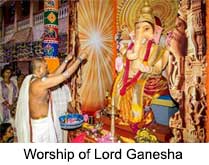 Worship of Lord Ganesha in Hinduism has been a custom among the followers to invoke Lord Ganesha at the beginning of prayers as well as in all ceremonies and cultural festivals. Lord Ganesha represents the power of the Supreme Being that takes away obstacles and guarantee victory in human accomplishments. By tradition, every religious festival begins with the worship of Lord Ganesha. He is also worshipped in Jainism and Buddhism.
Worship of Lord Ganesha in Hinduism has been a custom among the followers to invoke Lord Ganesha at the beginning of prayers as well as in all ceremonies and cultural festivals. Lord Ganesha represents the power of the Supreme Being that takes away obstacles and guarantee victory in human accomplishments. By tradition, every religious festival begins with the worship of Lord Ganesha. He is also worshipped in Jainism and Buddhism.
Lord Ganesha is one of the most popular Gods of Hinduism. Millions of Hindus revere him every day in temples and homes with utmost devotion. Ganesha is worshipped ritually by his devotees because of his status in the Hindu pantheon as the leader of the Gods. He has numerous temples in various parts of the world which are regularly visited by his devotees to offer worship and express their fears and concerns.
Reference of Worship of Lord Ganesha
In ancient Hindu scriptures, there are many references about worship of Lord Ganesha, the first of such reference is been found in the Rig Veda. There are also references in the great epics of Ramayana and Mahabharata, all of which indicate that the worship of Lord Ganesha dates back prior to 7,000 years ago or even earlier. The worship of Lord Ganesha has a long history, which dates back to at least pre-Gupta period or even earlier.
Reasons for Worship of Lord Ganesha
Every form of worship of Lord Ganesha has its own specific explanation. There are many reasons for believers for worshipping Lord Ganesha. Ganesha is an earthy god who combines in himself the powers of God and Nature. He is the "Vighnaharta" or the destroyer of all obstacles. As the remover of obstacles, and the upholder of Dharma, he also facilitates material as well as spiritual success in the mortal world by helping people achieve the four aims of human life. Worshipping Ganesha is considered very auspicious and beneficial for health and happiness. Lord Ganesha is one of the few Hindu Gods, who is said to solve all kinds of troubles and touch all aspects of human life with his holy presence.









